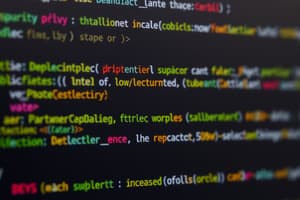Podcast
Questions and Answers
What is the data type used to store a logical value in Java?
What is the data type used to store a logical value in Java?
- char
- boolean (correct)
- float
- int
Which loop in Java guarantees that its body will execute at least once?
Which loop in Java guarantees that its body will execute at least once?
- switch statement
- do-while loop (correct)
- for loop
- while loop
In Java, what is used to conditionally execute a block of code based on a single expression?
In Java, what is used to conditionally execute a block of code based on a single expression?
- `switch` statement (correct)
- `for` loop
- `while` loop
- `if` statement
Which data type in Java is used to store a 64-bit floating-point number?
Which data type in Java is used to store a 64-bit floating-point number?
What is the primary purpose of a short data type in Java?
What is the primary purpose of a short data type in Java?
Which control flow construct in Java is best suited for iterating over a range of values or performing actions a fixed number of times?
Which control flow construct in Java is best suited for iterating over a range of values or performing actions a fixed number of times?
What is the purpose of a Java class?
What is the purpose of a Java class?
What does the concept of inheritance allow in Java?
What does the concept of inheritance allow in Java?
What does the 'finally' block ensure in Java exception handling?
What does the 'finally' block ensure in Java exception handling?
Which Java class represents a file or directory on the file system?
Which Java class represents a file or directory on the file system?
What is the main purpose of encapsulation in Java OOP?
What is the main purpose of encapsulation in Java OOP?
What does the BufferedReader class do in Java file handling?
What does the BufferedReader class do in Java file handling?
Flashcards are hidden until you start studying
Study Notes
Java: An Introduction to Core Concepts
Java, a popular and versatile programming language that's been around since the 1990s, is used for a wide range of applications—from mobile and web development to enterprise systems and scientific computing. In this article, we'll delve into some of Java's core concepts, such as data types, control flow, object-oriented programming, exception handling, and file handling.
Data Types
Java follows a strong typing approach, meaning each variable must be explicitly declared with its data type. The language offers a variety of primitive data types, including:
int: 32-bit signed integerlong: 64-bit signed integerfloat: 32-bit floating-point numberdouble: 64-bit floating-point numberbyte: 8-bit signed integershort: 16-bit signed integerchar: 16-bit Unicode characterboolean: logical value (trueorfalse)
Control Flow
Java provides several constructs to control the flow of execution in a program.
ifstatement: Conditionally execute a block of code based on a condition.switchstatement: Execute one of multiple blocks of code based on a single expression.forloop: Iterate over a range of values or perform a series of actions a fixed number of times.whileloop: Repeat a block of code as long as a condition remains true.do-whileloop: Similar to awhileloop, but the loop body executes at least once.
Object-Oriented Programming
Java is an object-oriented programming language, which means it emphasizes the use of objects to structure and encapsulate data and behavior.
- Classes: A blueprint for creating objects.
- Objects: Instances of classes, which can have their own state (data) and behavior (methods).
- Inheritance: A way to create new classes that inherit properties and behaviors from existing classes.
- Encapsulation: The process of hiding the internal details of an object and allowing access to it only through a public interface.
- Abstraction: The process of focusing on the essential aspects of an object, hiding its implementation details.
- Polymorphism: The ability to refer to objects using a parent class reference and call methods specific to their concrete type.
Exception Handling
Java provides a robust exception handling mechanism that allows programs to handle errors gracefully.
- Exception: An object that represents an error or an unexpected condition.
- Try-catch: Catch and handle exceptions that occur during the execution of a block of code.
- Throw: Explicitly throw an exception from a method.
- Finally: Ensure that a block of code is always executed, regardless of whether an exception was thrown or not.
File Handling
Java includes powerful capabilities for manipulating files and directories.
Fileclass: Represents a file or directory on the file system.FileInputStreamandFileOutputStream: Read and write data to files, respectively.BufferedReaderandBufferedWriter: Read and write text data from files, respectively.PrintWriter: Conveniently write formatted strings to files.Scanner: Read text data from files and parse it into individual tokens.
Java is a versatile and powerful language that offers a wealth of features for building robust, scalable, and maintainable applications. The core concepts discussed here—data types, control flow, object-oriented programming, exception handling, and file handling—form the foundation for understanding and building Java applications. As you delve deeper into Java, you'll unlock its rich capabilities and discover the many ways it can help you create innovative and impactful software solutions.
Studying That Suits You
Use AI to generate personalized quizzes and flashcards to suit your learning preferences.




